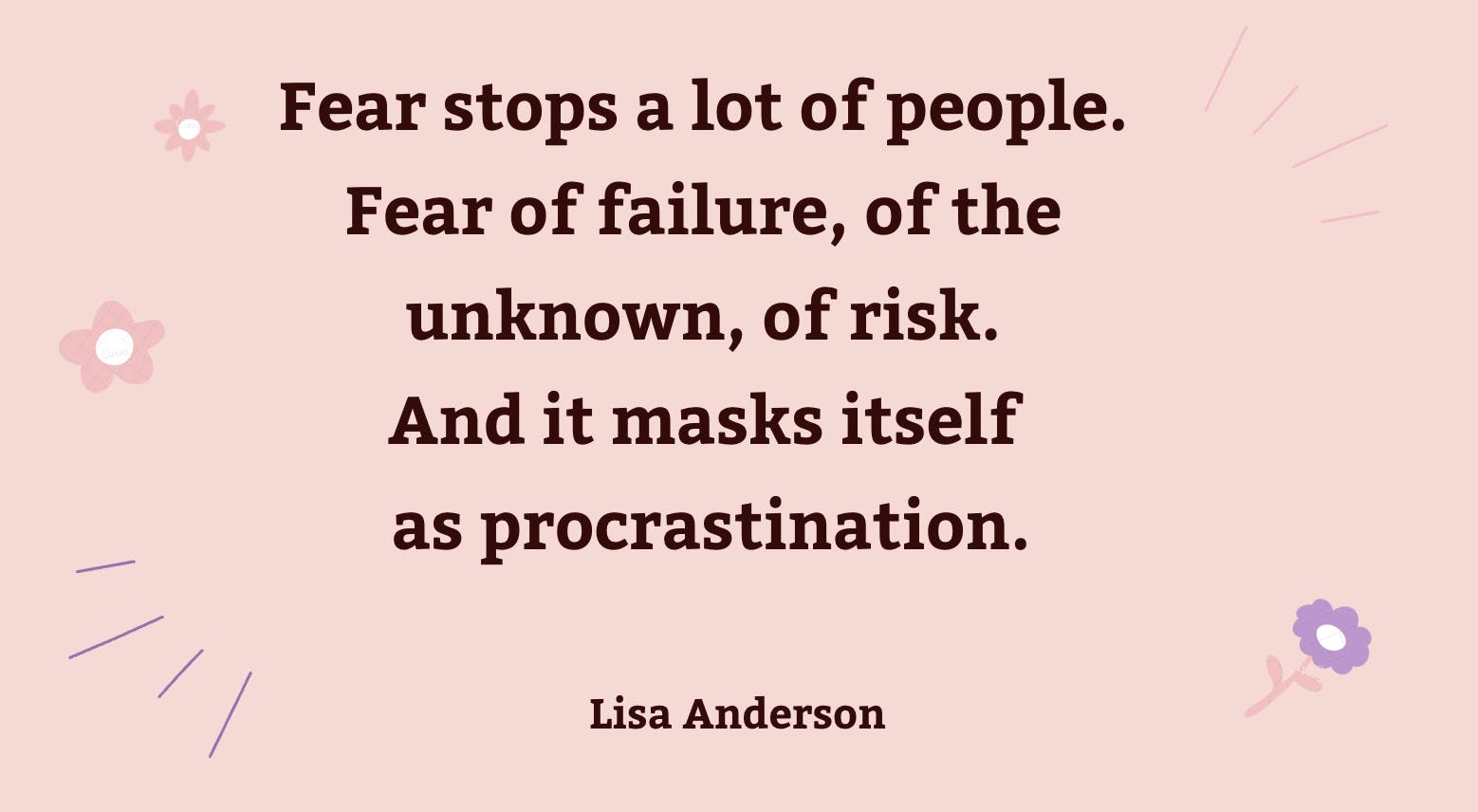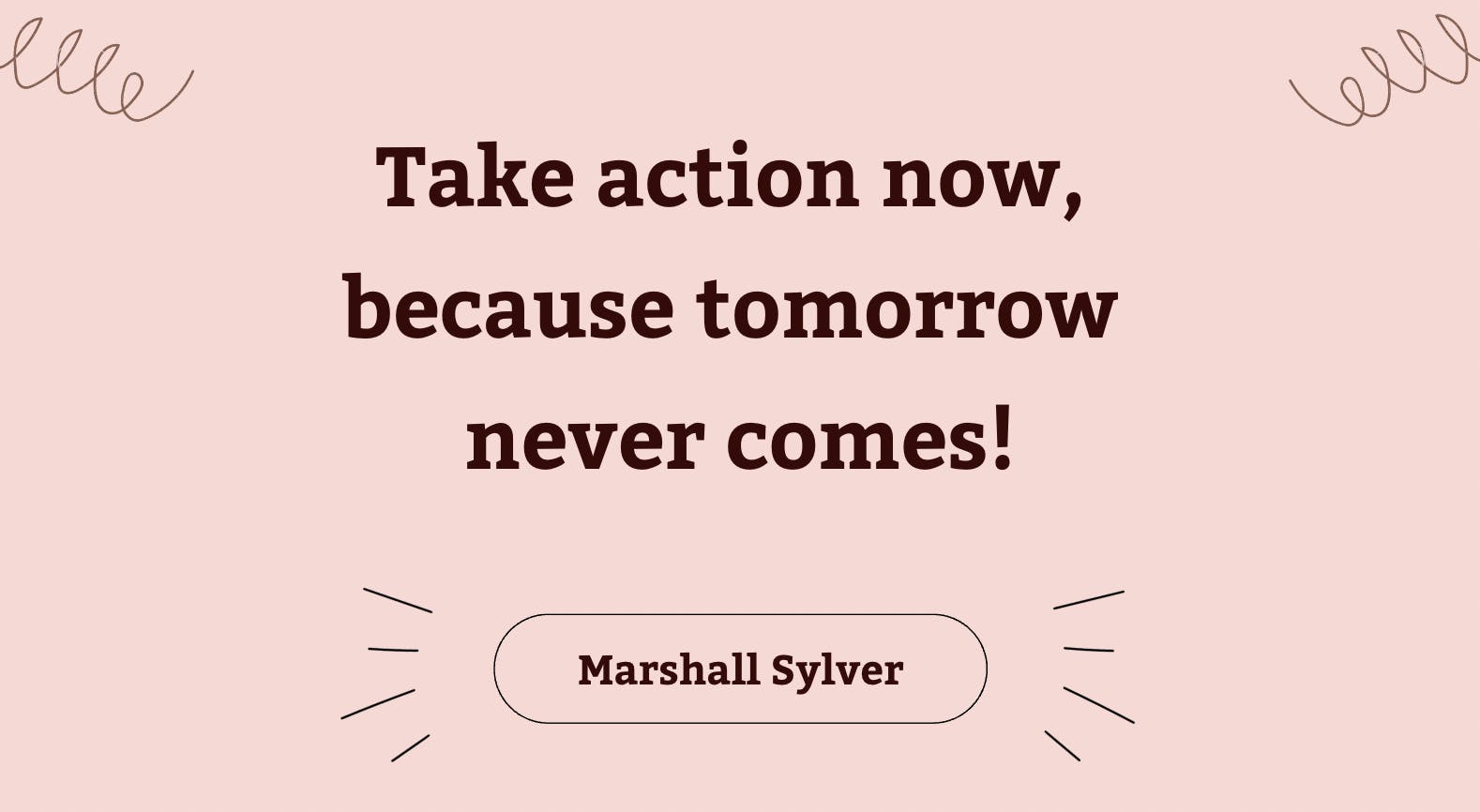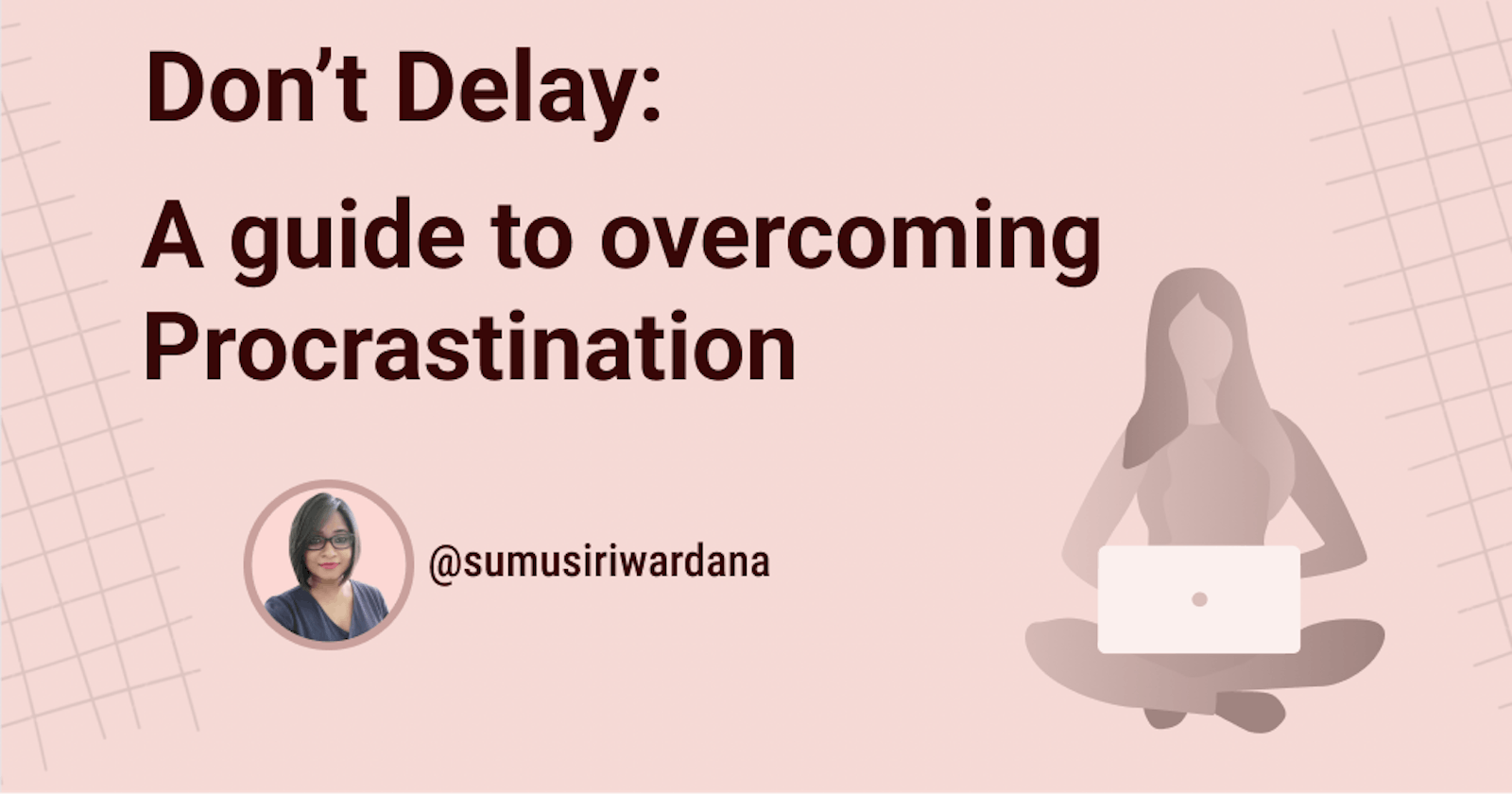Don't Delay: A Guide to Overcoming Procrastination
Unleash Your Potential with These Proven Anti-Procrastination Techniques
"Procrastination is like a credit card: it's a lot of fun until you get the bill."
- Christopher Parker
When I was younger, especially in school, I used to loathe preparing for exams. So even though I prepared a study plan, I never picked up the study materials when the time came. Instead, I used to tell myself, "I will read this novel for 10 minutes and then start studying." But that study time never happened. Sometimes, my mother checked on me to see whether I was studying, and I hid my novel inside the textbook and pretended I was reading the textbook.

I postponed my study time until a few days left for the exam and then rushed through my notes, trying to remember everything quickly. By the time I faced the exam, I was stressed, tired, and sleep deprived, which always led to having average marks for each paper. Each time this happened, I promised myself to stick to the study plan next time. But when the time came, I always ended up doing the same thing.
After a few years, I took accounting as a subject and realized I loved balancing sheets. So every day, I took a problem and worked on it. In a very short time, I became good at accounting. Then I combined this love of solving account problems with other subjects. For example, I promised myself that if I covered one economic concept, I would allow myself to work on an accounting problem. This helped me overcome my problem of studying, and I could score good marks during my A/Ls.
I started using this method whenever I got stuck with procrastination over the years. Sometimes it worked very well. But in some cases, my will to enjoy short-term satisfaction was stronger than focusing on the long-term goal or the benefit. Especially when I wanted to start a workout routine and start learning to program. So I started reading and researching how to stop procrastinating, stick to a schedule, and get things done.
Over the years, I came across some handy methods and tips which really helped me overcome this issue. Of course, there are lousy days once in a while, but my procrastinating problem has been reduced by 90%-95%.
If you are someone like me, who's a master of procrastinating, this article is for you to understand what procrastination is and how to overcome it.
What is procrastination
Procrastination is delaying or putting off things until the last minute or even after their deadline. The word "procrastinate" originates from Latin, which means ‘deferred till the morning’ or ‘belonging to tomorrow’.

At least once in our life, we have procrastinated on at least one task. This is a common thing among human beings. We sometimes delay taking action on a specific task, postpone dreadful appointments, and even avoid having stressful conversations.
While procrastinating here and there might not cause significant harm in achieving your goals, it could crush your goals and dreams or even cost your jobs if it becomes a habit.
Identify your procrastination triggers
Procrastination is a common behavior, and it's not the problem. Instead, procrastination is a symptom of underlying issues, such as perfectionism, a lack of motivation, feeling overwhelmed or overconfident, or fear of failure.
And these problems could occur due to mental health, ADHD, and personality traits such as low self-efficacy, Impulsivity, or low conscientiousness.
Identifying the trigger points of procrastination will help you to understand why you are doing it and allow you to take action to overcome it. Let's look at some common procrastination triggers.
Fear of failure: the fear of not being able to complete a task or doing it poorly can cause procrastination.
Perfectionism: it can be hard to start or finish things when you're trying to be perfect.
Lack of motivation: if you don't have a clear goal or intrinsic motivation, it can be hard to start something.
Distractions: getting distracted by social media, video games, or constant interruptions can be tough and make it difficult for you to focus on a task.
Boredom: if a task is tedious or unexciting, you might find it hard to summon the energy to do it.
Decision fatigue: when you make too many decisions, your brain gets tired, so it's hard to get started.
Overwhelm: you might feel overwhelmed by the size or complexity of the task, making it hard for you to begin.
Procrastination itself: procrastinating on one task can lead to procrastinating on other tasks, creating a cycle of delay.

You can analyze your emotions and understand why, when, and how you procrastinate. The first step in overcoming procrastination is identifying your trigger points. It always helps to be aware of the problem to overcome it. Then the tips below can help you develop a plan to make progress and stay on task.
5 Tips to overcome procrastination
1. Set small goals which can be achievable
Break down tasks into smaller chunks
Often you get overwhelmed when the task at hand is too big or the scope of the long-term goal seems much more significant. When you break down these big tasks and goals into achievable chunks, it's easier for you to focus on one part at a time and progress toward the end.
Want to lose weight? First, break down the goal into tasks that you have to do in order to achieve it. Then break down the exercises you want to do for each day. For example, Monday-Cardio, Tuesday-Leg Day, etc. When you break it down to the type of exercise you want to do each day, you have a clear idea of what you have to achieve each day without getting overwhelmed by the end goal of the workout.
Want to start learning web development? Break down the roadmap into subgoals with relevant resources. For example, you can make the first sub-goal learning HTML. Then, you can further break it into topics, such as learning
<!DOCTYPE>declaration, basic HTML tags, etc. Now you have a clear idea about smaller topics you have to learn each day or time.
Similarly, you can list down all the items you must complete the next day at the end of each day. While doing this, you can identify big tasks and break them into smaller chunks. Now you have a clear idea of what you want to complete tomorrow that is more achievable.
2-minute rule
If you already have the breakdown and you are still hesitant to start, you can start following the "2-minute rule". David Allen inspires the 2-minute rule: "If it takes less than two minutes, then do it now.”
When you want to exercise daily, make your only goal to put on your workout shoes.
When you want to learn a new programming language, make your only goal to write one line of code.
When you want to start reading daily, make your only goal to read one page.
When you want to write daily, make your only goal to write one sentence.
The idea behind this is to make your tasks easier to start. For example, working out for one hour might seem tedious. Or you might even feel lazy thinking about that hour. But putting on your workout shoes is an effortless task, and once you've put them on, you would instead start your workout than remove your shoes. Once you start, it's easier to keep the momentum and continue the task.
2. Organize your tasks
When you don't have a schedule or an agenda for a day or specific time, it's easier for your mind to forget what needs to be done, or procrastinate, thinking you still have time to achieve your tasks.
Once you break down your tasks, you can prioritize each and set a day to complete them. And create a schedule for each day, including specific times for different tasks. For example, if you are more productive in the early hours of the day, you can schedule your writing and learning during this time. If you have more physical energy than mental energy in the morning, you can plan your workout in the morning.
Creating a rhythm of "I'm going to do X now, and then I will do Y " each day by organizing your tasks helps you mentally prepare for each focus time, make it easier to move through your tasks, and build and maintain discipline.
Organizing your tasks with clear deadlines and a schedule to complete them can keep you motivated to achieve your main goal. Remember to include break times and keep a buffer for unexpected events in your schedule, so you don't get overwhelmed when things change.
3. Remove Distractions
It's harder to get things done or focus on specific tasks when you constantly get distracted or interrupted. So identify your distraction points and try eliminating them as much as possible.
If you tend to check your phone all the time and get distracted from social media and messages, put your phone into airplane mode, turn off your internet, or set up focus modes.
Block your calendar for the focus time, so no one schedules ad-hoc meetings without checking up with you.
If your current environment distracts you, find a quiet space to focus.
Snooze your work email and chat, or put your status as "Do not disturb".
Try to work on full screen on your computer so that you don't get distracted from other things (Especially from those 100 tabs you have already opened, including the social media sites 😉)
Clear your desk and remove all the unnecessary things and tempting distraction points such as books, phones, etc.
4. Focus your attention
Even after removing all the distractions, you might find it hard to focus on the current task. Sometimes you would feel like checking the phone, or you might think about the bigger task you have to do next.
Choose cakewalk or Eat that frog
You can focus on smaller and more manageable tasks to complete at first if you want to build momentum and motivate yourself to accomplish more within the day. But if you are a person who constantly stresses about big or more complex tasks, get rid of that stress by doing the biggest/hardest task first (eat that frog!)
Positive Rituals
You can also start creating positive rituals to prepare yourself for the focus mode. Have you seen sports stars doing some activities before they start playing? How are soldiers preparing for combat? These activities make them make decisions automatically and get into their focus mode.
You can clean your desk or count to 5 before you start your task. Or find a positive ritual that helps you to give your brain the signal of "it's time to focus!"
Set a timer or use the Pomodoro technique
If you have set your task for a specific period (Ex: Read for 30min, code for 30 min), set a timer for that time and work on one task until the timer goes off. During this time, you can focus on the task without checking the clock from time to time and move on to the other task after a break. You can use the Pomodoro technique to organize and manage your focus times.
5. Reward Yourself
Giving yourself a small reward after completing a task can be a great way to stay motivated and avoid procrastination. Find tempting rewards that can motivate you so that you tend to complete the task to get your bonus. You can use different reward systems to combine with your tasks.
If-then rewarding
Plan your tasks with the if-then intention, in which you reward yourself by doing something you really like (such as hobbies, favorite food, etc.) after completing a task.
If I complete this programming topic, then I will allow myself to play a game for 30 mins.
If I complete the essay, then I will allow myself to read one chapter from the new novel.
If I complete two tasks, then I will allow myself to watch TikTok/Reels for 5 minutes.
This will help you to create excitement to finish your task so that you can reward yourself with your hobbies and guilty pleasures.
Temptation Bundling
Another technique you can use is "Temptation Bundling". Temptation bundling combines an activity you procrastinate on with an activity you like to do.
You could watch a TV/movie only while you are using the treadmill.
You could listen to podcasts/audiobooks only while you are coding.
You can listen to music only when you are at the gym.
Temptation bundling will help you complete your tasks delightfully and build healthier habits by combining your favorite activities or guilty pleasures.
Bonus tip: Forgive yourself
Overcoming procrastination takes time and discipline. Don't beat yourself too hard if you fail to meet your goals. Punishing yourself for being too lazy or worrying about being unproductive will increase your anxiety, stress, and frustration, making you even more unproductive with those negative thoughts.
Be kind to yourself and learn what mistakes you made and why you made that decision/took that action. And adjust your techniques each time when you fail. Finally, remember never to give up and start over and over again with self-compassion until you reach your goals.
The Bottom Line
Procrastination is a common human behavior. The first step toward overcoming procrastination is understanding its cause and trigger points. You can start understanding this by writing down the goals/tasks you should do and how, when, and why you’ve been procrastinating on them.
Next, you can use some of the tips and anti-procrastination techniques mentioned here that might help in your situation and start implementing them.
Remember, you don't have to overcome this on the first try. If something doesn't work, experiment with some other technique. There are numerous kinds of research on this topic where you can find more tips and techniques. If you still feel like you are struggling, you can always seek help from coaches, therapists, and friends.
The most important factor is "start now, don't wait till tomorrow!"

I hope this post helps you understand the causes of procrastination and how you can use some anti-procrastination techniques to overcome it. If you have any more things to add to these tips and techniques, I would love to hear from you 😊
